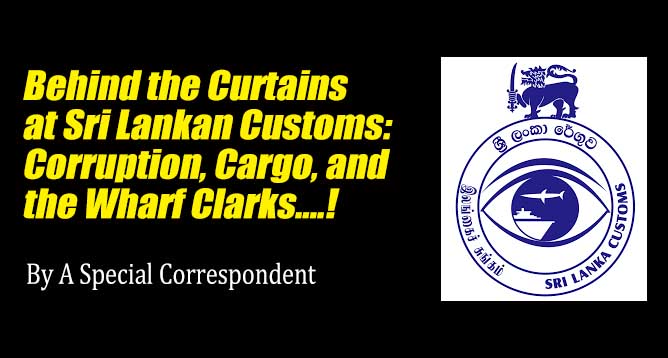-By A Special Correspondent

(Lanka-e-News -17.Nov.2024,11.20 pm) Sri Lanka’s customs department, the gatekeeper of the nation’s imports and exports, has become infamous for its intricate web of corruption. From bribes exchanged in backrooms to containers whisked through checkpoints without inspection, the system operates like a well-oiled machine—just not in the way it’s supposed to. And at the heart of this scandal are two main players: the “Wharf Clarks” and certain customs officials, working hand-in-hand with large importers to sidestep regulations, dodge taxes, and rake in illicit profits.
If you’re wondering who these Wharf Clarks are, think of them as the unholy love child of a fixer and a broker. These individuals are not officially part of the customs department but operate as intermediaries. With a vast network of connections, they ensure that containers and cargos breeze through customs without so much as a glance at their contents.
1. Networking: These Wharf Clarks have forged deep ties with customs officials and influential shipping agents. They know exactly who to call, when to call, and how much to offer.
2. Under-the-Table Deals: Importers looking to cut corners pay these brokers to negotiate reduced duties or bypass inspections altogether.
3. Zero Oversight: Containers cleared by Wharf Clarks are often not inspected. Duties are “settled” off the record, leaving the official system none the wiser.
It’s no exaggeration to say that these Wharf Clarks are the puppet masters of this corrupt ecosystem.
Customs officials are no innocent bystanders in this operation. Over 1,400 detailed reports on their assets—including bank accounts, luxury vehicles, and properties conveniently registered under family members’ names—paint a damning picture.
• Selective Scrutiny: New importers or businesses not part of the “network” are subjected to excessive inspections and slapped with inflated duties, effectively discouraging competition.
• Customs Clearance for a Price: Containers of favored businesses, managed by Wharf Clarks, are cleared without inspection, even if they contain restricted or misdeclared goods.
• Bribes and Kickbacks: Payments are distributed among a network of customs officials to ensure smooth transactions.
This cozy relationship benefits everyone involved—except, of course, the government and the honest taxpayers footing the bill.
The corruption doesn’t end at customs. A staggering 73 shipping companies have been identified as co-conspirators in this racket. Their role? To manipulate shipping documentation, falsify cargo details, and ensure that import duties are minimized or evaded altogether.
These companies work closely with Wharf’s Clarks, providing them with insider information and resources to facilitate corruption. From altered invoices to forged certificates of origin, their involvement is critical to the operation’s success.
At a time when Sri Lanka’s economy is under immense strain, this corruption drains billions in potential revenue. The International Monetary Fund (IMF) and the Finance Ministry have flagged the customs department as a major leak in the nation’s finances.
Customs revenue, according to official reports, has “reached the ceiling.” But experts argue that this is a lie disguised as a statistic. If corruption were eradicated and duties properly collected, revenue could easily double. Instead, billions are funneled into private pockets while Sri Lanka struggles to pay off its debts.
The NPP government has proposed digitalizing the customs system to eliminate corruption. Digital systems promise transparency, real-time tracking, and reduced human involvement—precisely the things the old guard fears most.
But let’s be real: digitalization is only half the battle. As long as the network of Wolf Clarks and corrupt customs officials remains intact, they will find ways to exploit even the most sophisticated systems.
The key to rooting out corruption lies with whistleblowers and the public. Already, one brave individual has provided five Excel sheets detailing the financial links between customs officials, Wharf Clarks, and shipping companies. This treasure trove of information includes:
• Bank account details
• Real estate holdings
• Business ventures in family members’ names
The government plans to launch a public platform where whistleblowers can report corruption anonymously. Additionally, a new hotline will allow citizens to directly report suspicious activity.
And here’s the twist: the NPP government intends to name and shame those involved. Photos, asset details, and even family connections of corrupt officials and their accomplices will be published.
Publishing names and photos of corrupt officials is bold, but it’s not without risks. Corrupt networks thrive on fear and loyalty, and exposing individuals could provoke backlash. However, it sends a clear message: corruption will no longer be tolerated.
Transparency is the ultimate disinfectant, and naming and shaming could deter would-be offenders. For those already implicated, the walls are closing in fast.
The customs department, once seen as a pillar of national security and economic stability, has become a symbol of greed and inefficiency. The corruption of Wharf Clarks, customs officials, and shipping companies has created a system where only the well-connected thrive.
But change is on the horizon. Digitalization, whistleblower protections, and public accountability measures are steps in the right direction. For too long, corruption at customs has drained Sri Lanka’s coffers and stifled honest businesses.
It’s time to clean house, expose the culprits, and rebuild the customs system as a force for good—not greed. Because if we don’t, the real cost won’t just be in lost revenue. It’ll be the trust of the people, squandered for the sake of a bribe.
And no price tag can ever fix that.
---------------------------
by (2024-11-17 20:58:17)
Leave a Reply